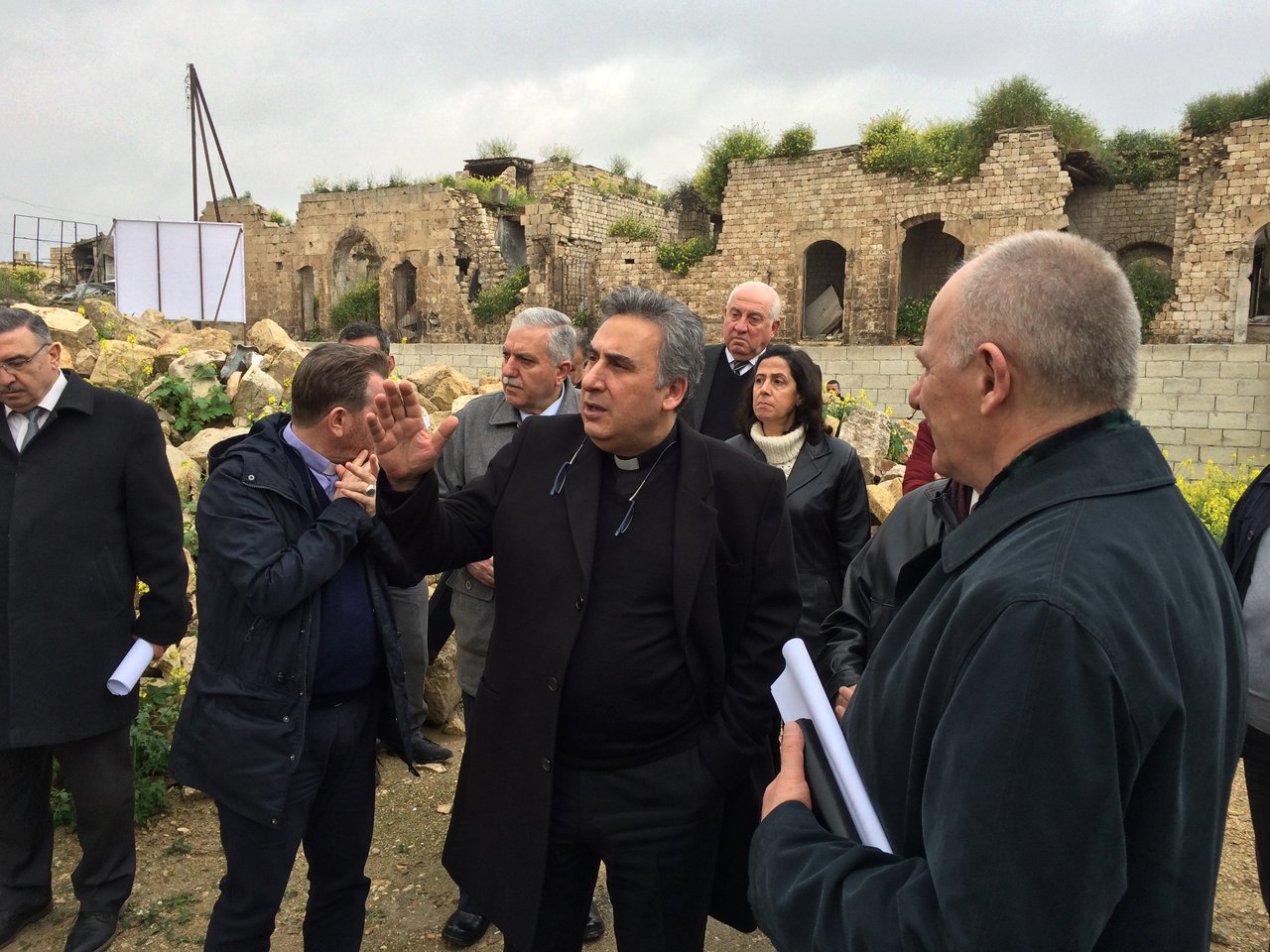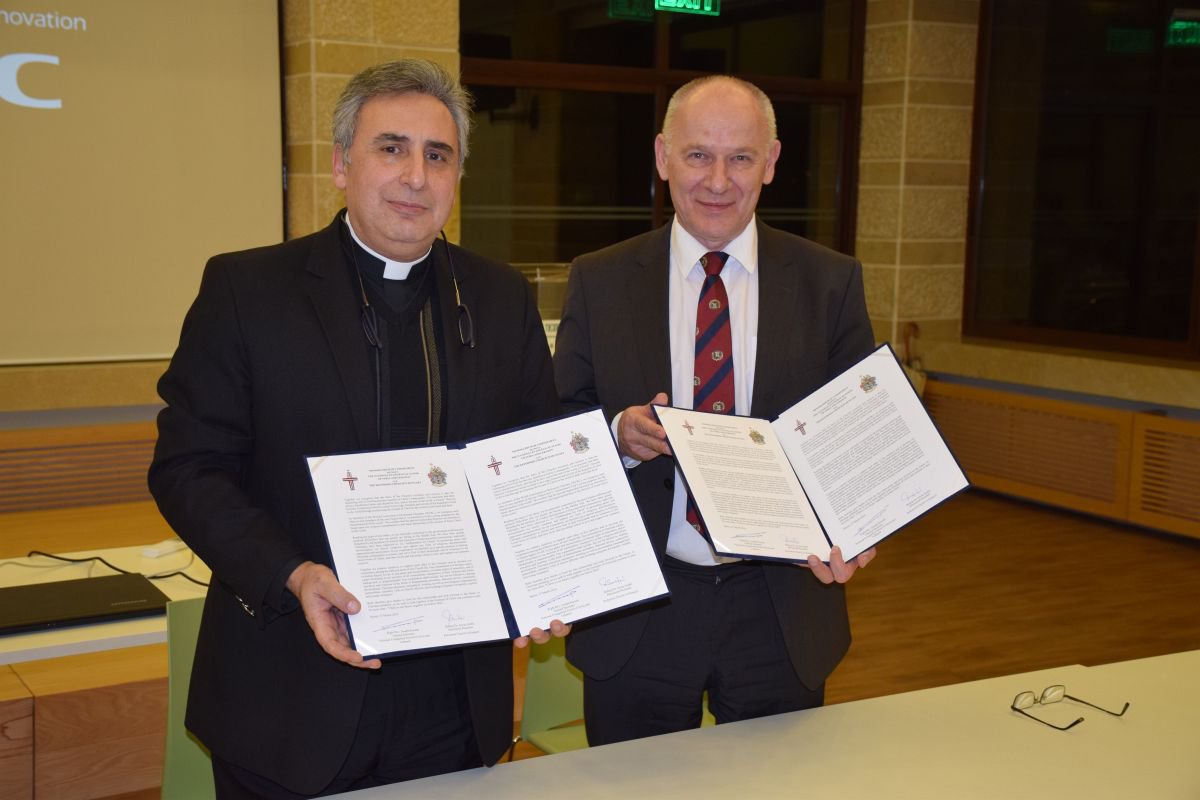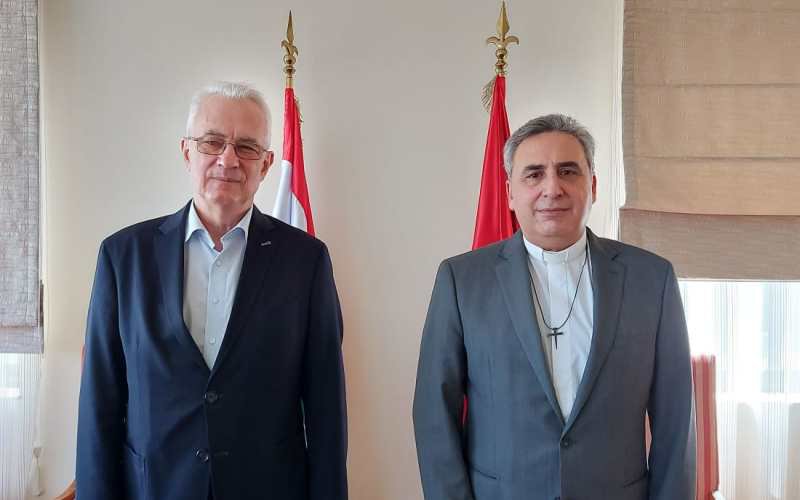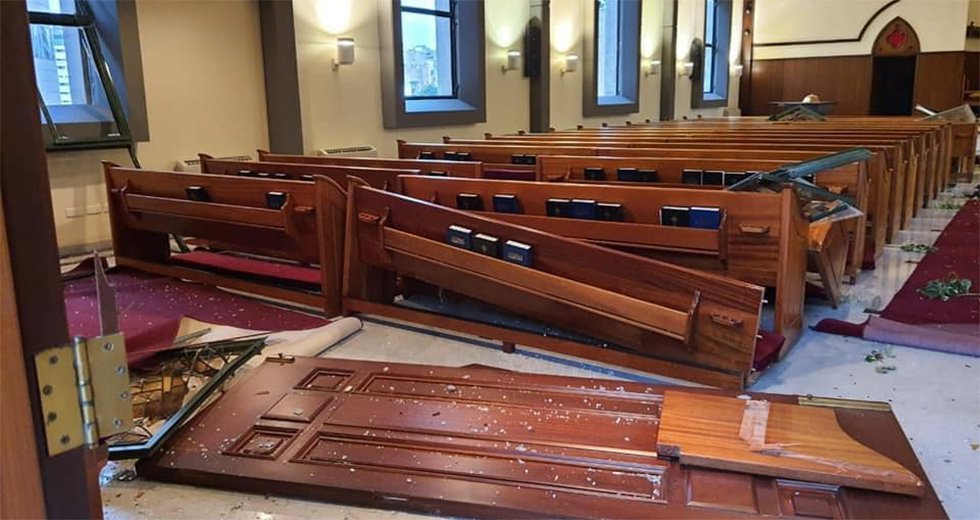Two partner churches of the Reformed Church in Hungary (RCH) received aid through the Hungary Helps Program in the past two years, the project period closed on the end of 2020. A total of 2 million USD of the Hungarian help served Reformed institutions of the country which are in critical condition, made bigger investments possible. They were also able to aid local families through humanitarian support. Principals of the schools of the National Evangelical Synod of Syria and Lebanon (NESSL) expressed their gratitude in a video. NESSL received a total of 1 Million USD which it spent for the implementation of various projects in the years 2019 and 2020.

It Was God’s Will, That We Live in This Region
NESSL is one of those two churches, which recorded their partnership with RCH with a contract in 2019. “We’ve learned how receiving help in trouble feels like, and now we would like to cherish hope in these hard times,” said Bishop István Bogárdi Szabó, previous ministerial president after signing the agreement in Beirut. After the solidarity visit in 2017 in Lebanon and Syria, and the repaid visit of the church leaders of the Middle-East in 2018, a 12-person delegation arrived to Beirut, and then to various cities in Syria, where they visited the projects financed by the Hungarian church and government support.
"Reading the signs of our times, we are especially concerned by the great human suffering and political difficulties that our people are facing in the Middle East. We have been greatly disturbed by the incidents of violence that innocent civilians and entire communities, especially Christians, have been subjected to. As “Ambassadors for Christ” in promoting peace and reconciliation, we strictly condemn and oppose any form of religious discrimination, oppression, and persecution. In our cooperation, we therefore give special attention to helping Christian communities to remain and serve God in their homelands and be witnesses to the Good News of Christ, and thus invite and encourage others to join and support our common mission," reads in the Memorandum of Commitment.

The history of the Arab-speaking Reformed community dates back to the North American Presbyterian mission in the 19th century, and despite their small size they played a significant role in the region since the time of the Turkish Empire when they were recognized as an official denomination. Although the number of functioning congregations of the Synod has decreased as a result of the Syrian civil war, 38 local communities still live in the two countries and several of its largest congregations are still located in the Syrian cities of Latakia, Homs and Aleppo. The church which has about ten thousand members follows the Reformed order in their theology and the Presbyterian order in their governing.
Their past and present are closely intertwined with social service, especially education and healthcare, and women have a significant role to play in all of this. The head of Christian education, women’s and children’s work of the church is Nalja Kassab, the second ordained women pastor of the Middle East region, and president of the World Communion of Reformed Churches (WCRC). She also exemplifies well the basic values and social mission of the Protestant community. The institutional system of NESSL also speaks for itself. The small church maintains homes for the elderly, a conference centre, and a theological academy. Beside the six "ordinary" schools in Lebanon, they have set up four schools for Lebanese refugee children in Lebanon, but also operates four secondary schools in Syria that provides education for thousands of students in Hasakeh, Homs, Aleppo, and Kamisli.
“The role of Protestant churches should not be underestimated in Lebanon and Syria, not socially, nor within the ecumenical community, even if with their small size it is given. It was the Protestants who initiated the ecumenical movement in the area after all. They were at the forefront of service among children, youth, and women. In the traditional churches of the Middle East this never existed before. Last but not least, Protestant have had a decisive influence on education in Syria and Lebanon. It is to their credit that young girls and women have found their way to schools and universities. Protestant schools have a very good reputation throughout the region,” summed up an earlier interview with general secretary Joseph Kassab about what the social role of the mission of the Protestant churches is. “In this ugly war, the Church in Syria has learned to be a better Church, taking care of people, including those outside of the Church. The Church is finding deeper meaning in the midst of suffering and pain,” he added in a public lecture at the Károli Gáspár University of RCH in 2018.
Local Reformed communities want Western churches to understand that Christians in the Middle East want to live in their own country. Even though many Christians have been forced to flee, “we believe that it is God’s will for us to live in this region and bear witness to His love here. We expect our Western brothers and sisters to help us with this,” said the general secretary.
The Reformed community in the Carpathian Basin supports the Syrian congregational Sunday School Program in this spirit since 2017, as well as the scholarship program for Syrian Reformed schools, which helps families in the country which has been plagued by war and on the brink of economic collapse, taking over all or part of their children’s tuition. The Hungarian government also welcomed the general secretary’s request, deciding on a grant of 310 million Hungarian Forint at the end of 2018 under the Hungary Helps program. NESSL spent the aid on maintaining its educational institutions in Beirut until the end of 2020, preparing for the expansion of the Aleppo dormitory, community centre, and to a lesser extent, humanitarian programs to keep families in Lebanon and Syria.
Thank you Hungary Helps!

Ambassador of Hungary in Beirut, Dr. Géza Mihályi paid a visit to the General Secretary of the Supreme Council of the Evangelical Community in Syria and Lebanon Reverend Joseph Kassab in August 2020.
The political and social crisis, which has existed for years, the financial and banking crisis worsening in 2020 was compounded by the Coronavirus pandemic and the explosion in Beirut on August 4, which also affected Christian communities, including NESSL’s six Lebanese schools directly. About two-thirds of the Lebanese public education is provided by private schools, a significant portion of which are church-run. The crisis threatened to close schools because families were unable to pay tuition. Support for Syrian congregations and institutions began to decrease, and repairing the buildings damaged in the explosion put a large financial toll on the schools. Not to mention housing Syrian refugees in Lebanon. Without the support of Hungary Helps, they would not have been able to ensure the survival of the schools.
The principles of the three supported schools reported in a video on the situation of the institutions and students and they personally expressed their gratitude for the Hungarian support, which was a great help socially, financially, and mentally in the critical situation. They were able to successfully complete the 2020 school year and start the new season with renewed strength. The support made it possible for teachers to receive their salaries, for students to receive partial tuition exemptions, and for children of Syrian refugee families zo continue their education. The Hungary Helps program essentially saved schools from closing.
Principals of the Reformed Schools Express Their Gratitude
Christine – Secondary Evangelical School Principal
At the deep financial crisis in Lebanon and the capital control, on top of the Covid-19 has caused a huge financial problem and left so many families jobless. This financial crisis left so many families struggling to pay tuition at our school which left our school at risk to shut down to be honest, but the financial aid from Hungary Helps came as a blessing at the right time. It has impacted so many families and so many teachers in our community which will allow parents to continue enroll their students in our schools which will allow us as a school to continue to instil evangelical values. So, we can build a better place for them to live in.
Samer Al Jamal – Beirut Evangelical School for Girls and Boys Principal
The Covid-19 pandemic affected a lot our community, our work community. Parents, teachers, students, staff, everybody. Add to that of course the financial crisis in Lebanon, whether starting October 17 or after the explosion on August 4. Financially, parents were drained, many were kicked out of their jobs, I’m sorry to say that, many were only payed half their salaries. Consequently many were not able to continue or pay their dues. The Hungary Helps’ generous donation brought a lot of relief to the parents. It helped them to first of all finish the 2020 academic year and then also to start 2021 in a fresh and energetic way. They are relieved socially, emotionally, and of course financially. One more thing to add: Hungary Helps also helped our staff and our teachers in terms of their income, because the income of the school was not adequate enough to pay full salaries for the teachers and thus we payed around 50% of their salaries. So here came the rescue with the Hungary Helps added. We were able to pay part of their salaries through this generous donation.
Nelly – Qob Eliass Evangelical School Principal
I’d like to thank Hungary Helps for the support that was given to the students who didn’t have money to pay the tuition. Some of their parents lost their jobs and also the support helped the unpaid teachers and employees, and this is very well appreciated. Covid-19 affected our school in several aspects: first of all, we have nearly total closure of the school which means interruption of the education. Students have to stay at home most of the time. It has impact also on teachers and on the schools. Also, this impact of this closure has consequences psychologically, economically, and socially at the same time. Thank you Hungary Helps!
Humanitarian Aid And Reconstruction
NESSL has also started expanding the campus of the Boy’s College in Aleppo thanks to the Hungarian support. Founded in 1923, the educational institution has excellence among its former students like former Syrian president Nazim al-Kudsi. The College was also attacked in 2012 and 2013 when Islamist insurgents occupied the institution that included primary school and high school for a long time. “Teaching paused during this time, and after the insurgents withdrew, the school building was in ruins. Nevertheless, we tried to resume our service immediately,” said Joseph Kassab earlier. The 2013/2014 school year started again with 60 more students, 550 students registered for the 2017/2018 school year and this year it is home to almost a thousand young people. Thanks to the Hungarian support the plans for the expansion of the college and the investment permits were completed and the construction could also start.
Following the explosions on August 4, 2020, NESSL’s aid organization, the Compassionate Protestant Association launched a humanitarian project called Beirut Hope. The church is helping thousands of distressed families directly and has also begun restoring damaged churches and church buildings. From the funds released with the help of the Hungary Helps program and the donation from RCH, 92 families received direct home renovation support from fourteen Arab reformed congregations worth about 20 million Hungarian Forints.

The Syrian Humanitarian and Rehabilitation program, which was launched in 2013, provides international support to 1,500 families in 20 highly disadvantaged areas of Syria. Thanks to the support of the Hungarian Government and the church in 2019 nine congregations were able to receive direct aid. Under the program students in need, widows, orphans, and disadvantaged families receive significant assistance for their daily needs; school supplies, heating oil, food, and food stamps as well as access to medicine for Christian families. Humanitarian aid includes the provision of water and toiletries, while refugees forced to flee their homes within the country receive housing assistance. Children who suffered trauma during the war are cared for by mental health professionals.
The aim of the Hungarian aid is to keep Christian families in place despite their hopeless situation in line with the intention of the Arab Reformed people to return the displaced to their homes and to begin the long-awaited reconstruction that could ensure the Christian community in post-war Syria.
Translated by Csenge Kiss
Proofread by Claire Weihe